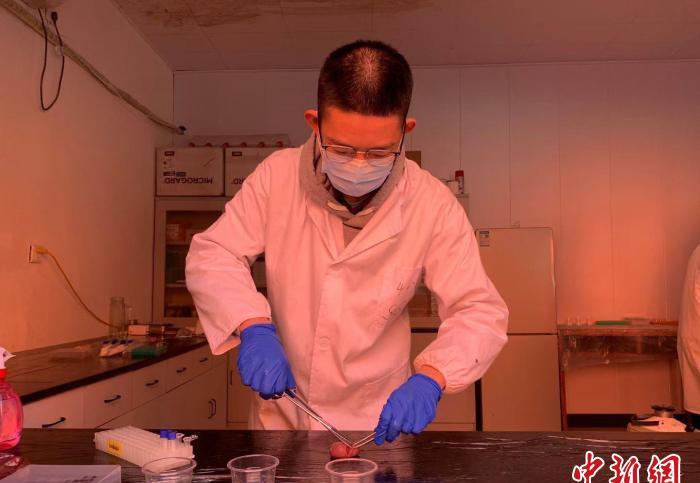
Students study lambs. Photo by Tianyi
Hangzhou, December 16 (Xie Panpan, Chen Shengwei) "Through this experiment, we found that the high-quality fat lamb meat cultivated by early weaning technology and the technology of promoting rumen development is more delicate. Speaking of an experiment that was just completed, Zhu Anran, a student of the 211st class of animal science at Zhejiang Agriculture and Forestry University, still remembers it because it was the "most delicious" experiment he had ever done.
This experiment is one of the main contents of the project "Experiments in the Production of High-quality Lamb by Early Weaning Technology" implemented by Professor Wang Chong of Zhejiang Agriculture and Forestry University.
Zhu Anran and classmate Wang Mingjie prefer to call this experiment "sheep pot", because the core purpose of the experiment is to test whether the quality of the lambs they breed with new technologies is more delicious than ordinary lamb, and the main work of the teachers and students of the entire experimental team is not to take the test tube to do testing, but to slaughter and process the lamb together. Teachers and students participated in the whole process from experimental design to project implementation, scientifically and rigorously controlling variables, feeding precisely, and finally slaughtering lambs, processing and tasting.
Lamb. Photo by Tianyi
It is understood that the lake sheep is one of the important livestock in the Taihu Plain area such as Hangjia Lake, and is a rare white lambskin sheep breed, with ideal meat production performance and high temperature and humidity resistance after improvement. Because of these excellent characteristics of lake sheep, Professor Wang Chong's team, which has been committed to the research and development of high-quality livestock products, has joined hands with Zhejiang University, Zhejiang Animal Husbandry Technology Promotion and Breeding Livestock monitoring station and other units in recent years, as well as major lake sheep breeding enterprises in the province, to promote the introduction of lake sheep in Xinjiang, Sichuan and other places.
In order to complete this experiment, as early as half a year ago, Wang Chong, a professor at the College of Veterinary Medicine of the College of Animal Sciences of Zhejiang Agriculture and Forestry University, took the students and began to carry out the breeding experiment of lake sheep on the farm.
In the experiment, the students entered the production line, not only fully familiar with the sheep barn, learned the knowledge of sheep raising, but also put the knowledge learned into practice.
"By participating in the project research, we learned how to cultivate healthy lambs through scientific means, and also learned the sampling method, collecting the blood, liver, spleen, kidney, subcutaneous fat, and longest muscles of the lake sheep." Throughout the process, everyone deeply realized the importance of combining learning professional knowledge and practice, and how to apply what they have learned to practice. Wang Mingjie, who participated in the experiment, said that the most interesting experimental link was the meat tasting of lamb, and personally identified the feasibility of fat lamb as a high-grade barbecue raw material.
In recent years, in order to further improve the quality of lake sheep, Professor Wang Chong led students to develop the relevant technology of healthy breeding of lake sheep and "a semi-fluid feeding system", and successfully authorized the national invention patent and software copyright. Related technology through the addition of health-promoting functional amino acids and flavor substances, so that the lamb meat is fat and not greasy, tender and refreshing, from the source to ensure the quality and taste of the product.
"Our technology has been applied to more than 220,000 sheep and 24,000 cattle, with an output value of more than 260 million yuan, which has promoted the growth of farmers, increased income, opened up new channels for getting rich, and improved the utilization rate of resources, so that the thorny problem of agricultural and sideline products treatment can be solved and waste into treasure." Professor Wang Chong said that in the past, people usually believed that the southern mutton was inferior to the northern mutton, and through research, it was proved that the quality of raising lake sheep through science was higher than that of northern lamb, and promoting lake sheep breeds could also contribute to improving the meat and sheep breeds in various places, which was both the responsibility of scientific and technological workers in colleges and universities, and a way to serve rural revitalization. (End)
Source: China News Network